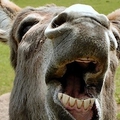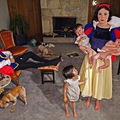Örömmel jelenthetem, hogy minden Lobster halhatatlan!
Ez hivatalos.
A Lobster azon kevés állatok egyike, amelyik nem öregszik, sőt, egyre menőbb lesz a korral. Ezen túl a Lobsterről még nem bizonyították be, hogy magától meghal - feltéve hogy nem lépnek rá, nem betegszik meg és igen... a gyűlöletes forróvizes fazekat is sikerül elkerülni.
But there's one lobster fact that trumps them all: lobsters show no apparent signs of aging. They don't slow down or become weaker or more susceptible to disease. They don't get infertile -- older lobsters are actually more fertile than younger ones. Most lobsters seem to die because of something inflicted upon them and not because a body part failed or broke down. They're such hardy creatures that scientists aren't even sure how old lobsters can get. Add in that lobsters grow throughout their lives, and one has to ask: Is it possible that a lobster born before Napoleon and as heavy as an NFL lineman is chowing down on the sea floor?
És álljon itt egy figyelmeztetés: A Lobsterek sosem állnak le a növekedéssel.
Lobster Power!
Caleb Finch at USC coined the term "negligible senescence" to describe very slow or negligible aging (Finch 1990). He listed several animals with this characteristic, including rockfish, sturgeon, turtles, bivalves and possibly lobsters. Later in a paper from the first Symposium on Organisms with Slow Aging (which the Director of this project also spoke at), Finch further described criteria to test the occurrence of negligible aging. These include no observable age-related increase in mortality rate or decrease in reproduction rate after maturity, and no observable age-related decline in physiological capacity or disease resistance (Finch and Austad 2001).

 12JszXJwXf1rPKA8a9dDPQPeJmVzQgm4g7
12JszXJwXf1rPKA8a9dDPQPeJmVzQgm4g7 



